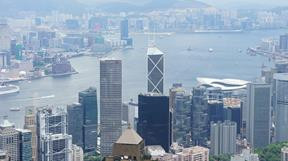Hong Kong implemented stringent new anti-COVID-19 regulations on Wednesday, prohibiting flights from eight countries, closing pubs and fitness facilities, canceling large-scale events, and suspending nighttime restaurant eating following the detection of the Omicron strain in the city.
The guidelines were issued as health officials scoured the city for contacts of a COVID-19 patient, some of whom were aboard a Royal Caribbean ship that had been ordered to return to port following a cruise order.
The new limits reintroduce social distance curbs that were in effect a year ago and were removed around Chinese New Year in 2021, when infections began to recede.
As with mainland China, Hong Kong imposed some of the strictest measures in the world throughout the pandemic, including nearly closed borders, weeks-long isolations, targeted lockdowns, and mass testing.
As of late Tuesday, Hong Kong had registered 114 Omicron cases, the great majority of which were identified at the airport or during the mandated 21-day hotel quarantine period for most visitors.
From Jan. 8 to 21, flights from Australia, Canada, the United Kingdom, France, Pakistan, the Philippines, India, and the United States would be prohibited, Hong Kong Chief Executive Carrie Lam told reporters.
Lam stated that health officials are now concerned that the contagious Omicron variant is spreading stealthily inside the population.
"We have examples where the source of transmission has been recognized but not the route of transmission," she explained.
The tightening comes as the Asian financial hub announced this week the first local case of coronavirus that officials have not been able to trace to its source.
The patient, an unvaccinated man who experienced symptoms prior to diagnosis, is suspected to be infected with the strain that has accelerated the spread of the virus around the world.
Additionally, all cruises have been canceled. On Wednesday, a ship carrying 3,700 passengers and staff returned to port for mass testing following the identification of nine people as possible Omicron carriers.
On Wednesday, Hong Kong registered 38 new COVID-19 infections, but only one was caused by a local community transmission; the remainder were caused by people who returned to the city after testing positive during quarantine.
Lam stated that the city would not temporarily suspend lessons "for the good of the children."
Meanwhile, the government is moving rapidly to avert a worst case scenario in Hong Kong, which is particularly vulnerable because of poor vaccination rates.
Hong Kong's stringent regulations have preserved the city to be enviably virus-free, with less than 12,000 cases and 213 deaths since the pandemic broke out.
Lam has stated that the resumption of transit routes with mainland China must come before the rest of the globe is reopened.





